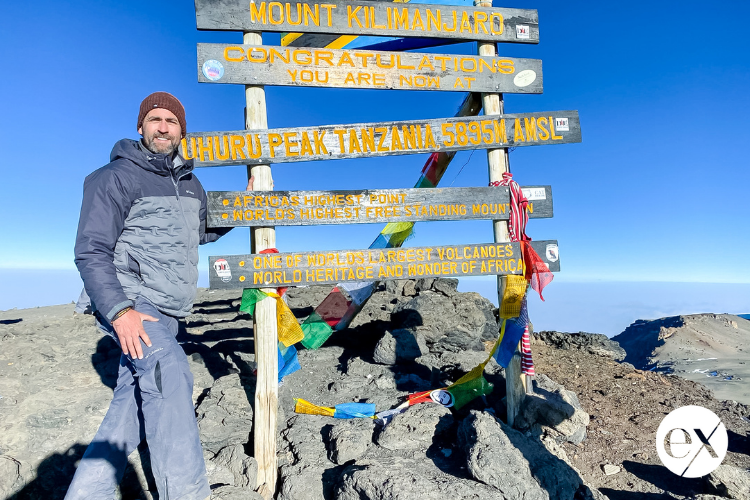
So you’ve taken the big leap. You’ve gone through with the divorce, and you feel you’re ready to start a new chapter of your life. What do you do from there?
For some, the answer lies in getting a fresh haircut, doing some deep cleaning, or maybe going on a weekend trip. But if you want to do something big, you could always follow in T.H. and Daniel Herrold’s footsteps and make the climb up Mount Kilimanjaro.
Jessica and T.H. had the opportunity to sit down with Daniel Herrold (one of the original founders of Divorced Over 40) for their Divorce etc… podcast. to talk about Daniel and T.H.’s shared experience of climbing the highest mountain in Africa (and the Eastern Hemisphere) after their divorces. And before we get into it, no, they didn’t convince Jessica to join them in this experience, and she will not be making that climb for herself. But if it’s something you are interested in, here are some things you should know before taking a step like this.
-
It’s Not Just About Physical Preparation
Climbing Kilimanjaro is no easy feat. There’s a lot of prep that goes into the journey, and it’s not just about your physical ability. Though T.H. did a lot of work training physically for her journey, “that was kind of the wrong training. That wasn’t where I needed my strength.”
Daniel had the same realization. That the biggest challenge of the climb is the mental preparation that’s required. Yes, you need the physical strength, but without the right mindset for the long and slow journey up the mountain, you won’t have the strength to reach the summit. You have to be prepared to have that time alone with your thoughts.
-
Patience is Needed for the Climb
The big challenge isn’t that you’ve got to run up the mountain or dodge rocks while you take off speeding through the terrain. The challenge with Kilimanjaro is that you’ve got to take small little baby steps up the mountain. There’s no running, not even walking. For T.H., “to be forced to slow down was one of the best lessons that I learned on this trip.” She says the beauty of this climb is that it forces you to take that time, both for the climb and for yourself. To go from a fast-paced lifestyle with so much going on in your day-to-day life to this climb, inching your way up the mountain, is a valuable lesson to take things slow and give yourself time in your journey, both through the divorce and for the climb.
-
Everyone Goes At a Different Pace
Daniel’s trouble on the mountain started when the altitude hit. After hours of trying to keep up with the group, a guide offered to split from the group with Daniel, to take him at his own pace up the mountain. It was pitch black out as Daniel and his guide took baby steps at the pace he could manage, but this wasn’t a bad thing. Taking it slow was okay.
Everyone has their own pace. We heal, we move on, and we work at our own speed. No two people are the same. And in the end, Daniel realized that “it was something that was super mental tough, and I was able to overcome it. I can overcome anything.”
It’s okay to go at your own pace on your divorce journey as well. Whether you want to jump right back in the game, take a few years to yourself, or focus on other aspects of your life, it’s your choice and there is no right answer.
We, as people, are so much stronger than we give ourselves credit for. In T.H.’s perspective, it’s because we don’t ever really challenge ourselves in this way. And this just shows that getting out there, out of our comfort zone, is all the scarier, yet when we do it and accomplish a goal, it makes it all the more meaningful.
-
You Can Do It Alone
The interesting thing for Daniel was that while he was completing this solo self-reflection journey, he was actually in a relationship. For some, this might raise questions or seem out of the ordinary, but even in this position, it’s valuable to take that journey on your own and aim your focus at yourself and your path to healing.
It’s harder to be spontaneous when you’ve got an obligation to a partner. That’s just how relationships are; you each get a mutual say in what happens. But it’s important to seize freedom while you can and take that leap into the unknown, because who knows when you’ll have an opportunity to do so again?
-
Get Comfortable with Being Uncomfortable
As T.H. wisely puts it, “you have to be comfortable with being uncomfortable so that you can grow.” Divorce puts you in that position. And though you don’t need to go all the way to Africa to put yourself out there, there are so many other ways you can challenge yourself and begin to enjoy that discomfort. Like now, Jessica’s playing poker (or trying to play), and that’s definitely outside her comfort zone. It can even just be putting in that effort to try something new.
For Daniel, this embracement of the uncomfortable is empowering. There are so many things people will put on hold when married – dreams, hobbies, passions – and it’s important to view your divorce as an opportunity to pull these back off that dusty shelf and make them a priority once again. “Make sure that it’s an expectation in your next relationship,” Daniel suggests because it’s important to hold on to your desires even once you are with your partner.
-
It’s Your Journey
There’s a lot of courage and strength that goes into a big decision like T.H. and Daniel’s to climb Kilimanjaro. But there is just as much courage and strength involved in any way you choose to heal and self-reflect after your divorce. Even if you don’t climb an actual mountain, the lessons they learned on their respective journeys apply to every journey, and whatever you choose to do to grow after your divorce is your choice. Like Daniel realized, “Everybody has their own pace.” Whatever you choose to do is just as valuable as what the next person chooses to do. What’s important is that you do it and that it is your journey.
Leave a Comment
You must be logged in to post a comment.










